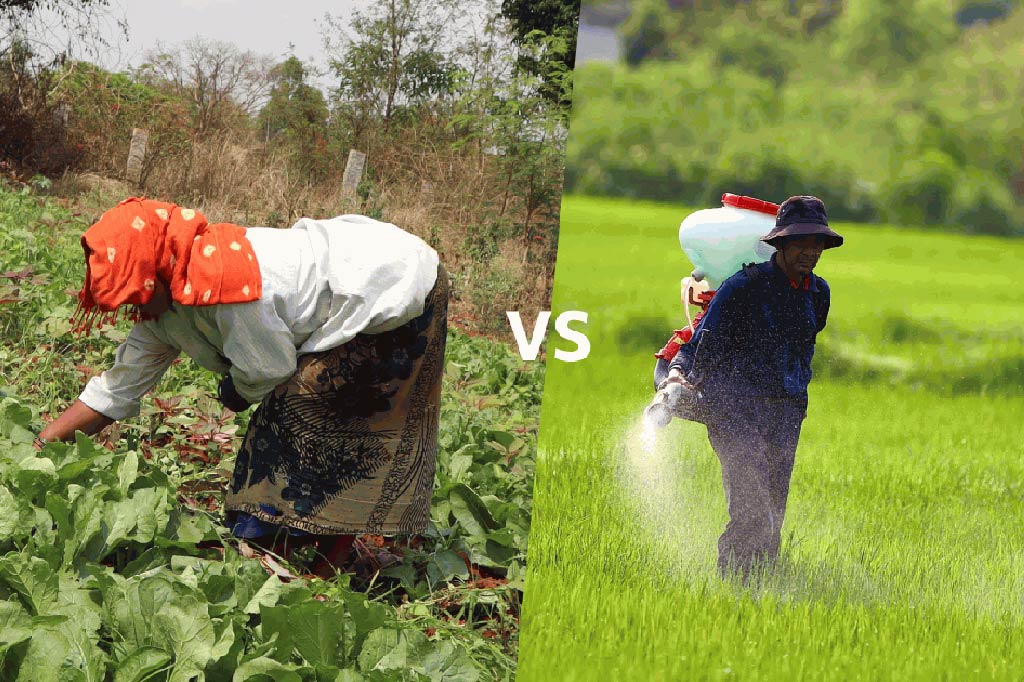
Nowadays, you will likely see a plethora of products in the market – from fruits and vegetables to groceries and more that all “claim” to be organic. And as a consumer, it can be confusing – what do you really trust? Before we address that issue in this blog, it is first important to understand the difference between organic and conventional farming to make an informed choice.
When it comes to agriculture, two primary methods dominate the industry: organic farming and conventional farming. While both aim to produce food, they differ significantly in their approaches. In this blog, we will explore the differences between organic and conventional farming and shed light on why organic farming is the superior choice.
Farming Practices:
The most fundamental distinction between organic and conventional farming lies in their farming practices. Conventional farming relies heavily on synthetic chemicals such as pesticides, herbicides, and fertilizers to enhance crop growth and protect against pests. On the other hand, organic farming like what we follow in Happy Harvest Farms and across all our partner farms, emphasizes the use of natural methods like crop rotation, composting, and biological pest control. By avoiding synthetic inputs, farming safeguards the soil, reduces water pollution, and preserves biodiversity.
Health Benefits:
When it comes to health, organic farming takes the lead. Organic crops are grown without the use of synthetic chemicals, ensuring that the food produced is free from harmful residues. This means consumers are less exposed to pesticides and other potentially toxic substances. Furthermore, organic farming promotes the use of traditional, non-GMO (genetically modified organisms) seeds, which further enhances the nutritional quality of the produce. By choosing organic, we prioritise our health and that of our loved ones.
Environmental Impact:
Farming is a champion in terms of environmental impact. Conventional farming practices often result in soil erosion, water contamination, and damage to ecosystems. In contrast, farming focuses on sustainable practices that promote soil health and water conservation. By avoiding synthetic chemicals, farmers help preserve beneficial organisms like bees, butterflies, and birds, which play vital roles in pollination and pest control. Organic farming also minimizes greenhouse gas emissions, contributing positively to the fight against climate change.
Long-Term Sustainability:
Organic farming is a long-term solution for a sustainable future. Conventional farming relies heavily on finite resources, such as fossil fuels for the production of synthetic chemicals. In contrast, farming emphasizes renewable resources and practices that work in harmony with nature. By prioritizing soil health, organic farming ensures the longevity of agricultural land, allowing it to remain productive for generations to come. At Happy Harvest Farms we do our utmost to support local and small-scale farmers and bring them within the ambit of organic farming, promoting economic resilience and community development.
Organic farming emerges as the superior choice when compared to conventional farming. Its sustainable practices, health benefits, and positive environmental impact make it a clear winner. By supporting farming, we contribute to a healthier planet and a better future for ourselves and future generations. It’s time to embrace organic agriculture for the well-being of both people and the planet.
So how do you know what you are buying is truly organic? The only determinant are organic certifications. This means the certifying bodies have done their due diligence and the produce has been deemed as organic by them. At Happy Harvest Farms, all our produce is certified by NPOP and PGS – India. Which means you can trust our produce with your eyes closed.
So don’t fall for claims like:
100% Natural
Residue-free
Contamination free
Traditional
Only trust – Organic certifications. All our produce is certified organic, making it TRULY, 100% organic